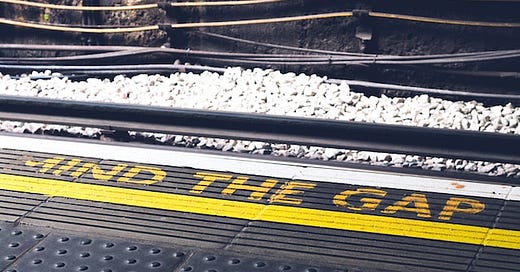Feeling Inadequate? Mind the Gap.
Closing the gap lies not in doing anything differently, but in seeing our experiences through a new, compassionate lens.
This morning, I saw two clients in a row who thought they “should” be doing better. Both of these women are quite capable, but they frequently feel like they’re coming up short. They routinely feel guilty, as if they “should” be doing more and better. When they struggle or make a mistake, it feels personal—it means something bad about them.
The first—we’ll call her Sahar—was “the capable one” growing up. She naturally demands a lot of herself and can usually pull off an impressive performance at whatever she puts her mind to.
The second—we’ll call her Francesca—was absolutely not seen as “the capable one” growing up. She struggled academically and socially, and though no one ever said so directly, she intuited that she was somewhat of a disappointment.
Do either of these sound familiar? Maybe you can relate to one of their experiences:
Scenario 1: You’re “the smart one,” or otherwise get labeled as “capable,” “talented,” or generally impressive in aptitude or achievement.
Scenario 2: You were not “the smart one” or other positive labels. You were somehow lacking, bumbling, inept, or couldn’t do anything right, either in your family or a prejudiced society. Expectations of you were low.
Either way, there was a gap.
If you lived out Scenario 1, there was a gap between the high expectations you and others set for you and the inevitable mistakes, flaws, and do-overs that life brings.
Capable people make mistakes. Smart people sometimes don’t know the answer. Talented people screw up.
But that gap got interpreted as your fault. And now, when you make mistakes, don’t know the answer, or screw up, your brain thinks it’s because you didn’t try hard enough, weren’t organized enough, or weren’t capable.
Our human struggles and errors feel like personal shortcomings, but it’s actually because of the gap between our unrealistically high expectations and how life, which is full of glitches and snags, plays out.
On the other hand, if you lived out Scenario 2, there was a gap between the low expectations set for you and your actual, totally adequate performance. So now, when you do things well or get good feedback, you doubt yourself. You question the validity of your good work.
And that gap renders your performance invalid. Anyone could have done well. You must have charmed them. You got lucky. You’re not actually capable—it was a fluke.
Your good work seems illegitimate—but it’s just the gap between unrealistically low expectations and reality.
These ideas are rooted in the original 1978 paper by Drs. Pauline Clance and Suzanne Imes on what they dubbed the Impostor Phenomenon, which has been twisted over the years in both name and meaning into the modern-day Impostor Syndrome, but that’s for another newsletter.
For both scenarios, the insecurity comes from the gap between our childhood messages and our lived experience. As Leslie Jamison, who wrote an excellent piece about the phenomenon for The New Yorker puts it, “Are my parents right (that I’m inadequate), or is the world right (that I’m capable)? Or, conversely, are my parents right (that I’m perfect), or is the world right (that I’m failing)?” Either way, it’s a disorienting, head-spinning experience that leaves us doubting ourselves.
Are these the only two models for feeling insecure? Absolutely not. There are a zillion oh-so-human pathways to doubting ourselves. But these are two I’ve seen over and over again, not just in Sahar and Francesca this morning.
Which leaves us with the question: what do we do about it? Hang tight for the next newsletter, but spoiler alert: closing the gap lies not in doing anything differently, but in seeing our experiences through a new, compassionate lens.





